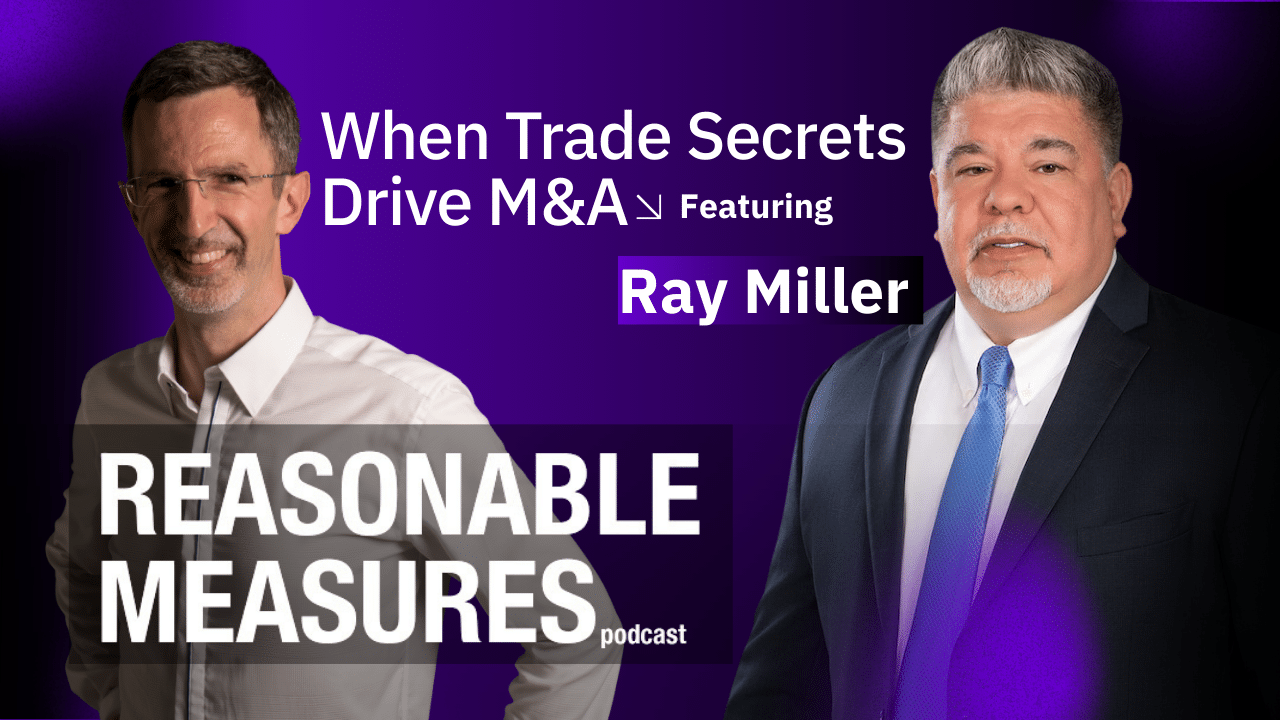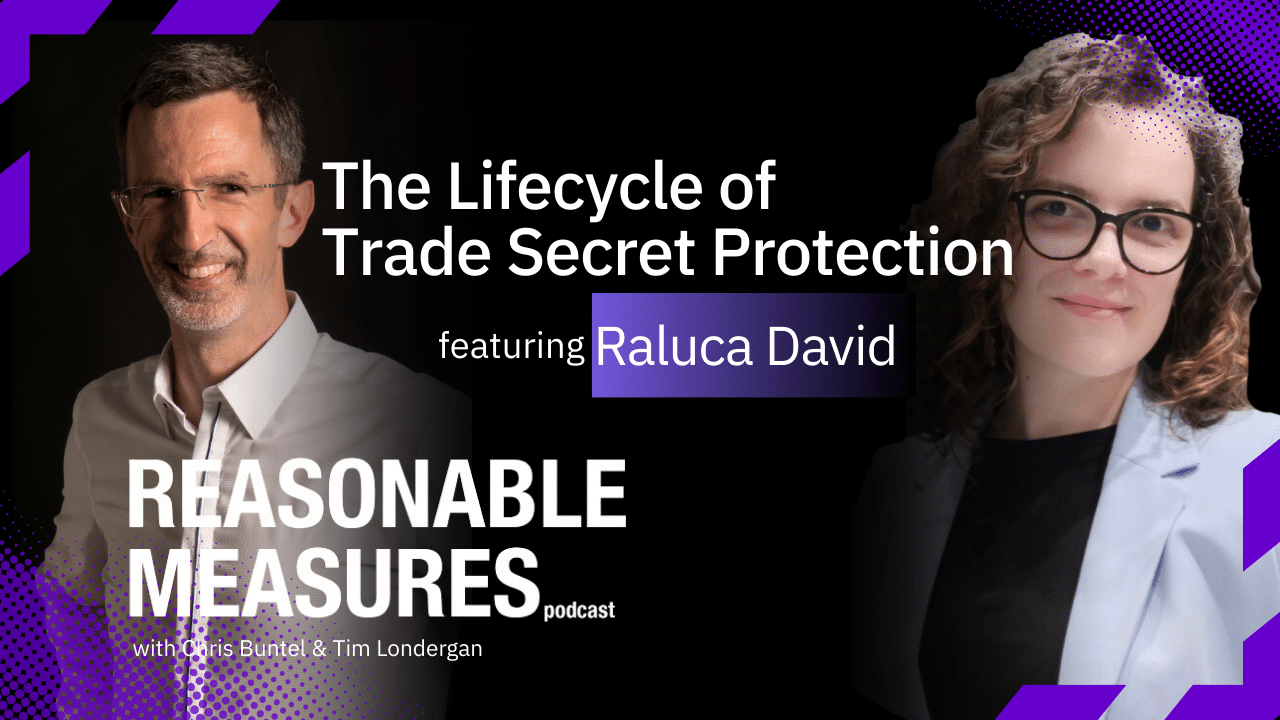概要
In this episode of the 妥当な措置 ポッドキャスト, Tim Londergan and Chris Buntel unpack one of the biggest developments in intellectual property this year: the $1.5 billion Anthropic copyright settlement. The discussion explores what the case means for creators, AI companies, and the broader balance between innovation and protection in the age of large language models (LLMs).
Tim and Chris walk through the details of the lawsuit brought by author Andrea Bartz and others, who alleged that Anthropic’s AI systems scraped copyrighted books without permission. They discuss how the resulting settlement reframes the boundaries of fair use and how it signals that AI generated progress now comes with a royalty price tag.
The conversation expands beyond copyright to consider how AI challenges traditional IP frameworks, especially around authorship, ownership, and creation. Chris and Tim also draw parallels to trade secret law, noting that while AI cannot legally invent or author, it can still create valuable trade secrets, making this form of protection increasingly central to the AI industry’s future.
Takeaways
-
- The Anthropic settlement sets a major precedent for AI and IP, affirming that large language models must pay for the data they use.
- Fair use arguments have limits. When entire works are reproduced or leveraged commercially, creators deserve compensation.
- The settlement highlights that copyright is only one part of the AI and IP equation. Trade secrets now represent the core value of many AI companies.
- AI cannot be a legal inventor or author, but it can generate protectable trade secrets, reshaping how innovation is defined and safeguarded.
- The outcome reflects a cost of doing business for AI developers, establishing a model for how future disputes may be settled.
- As Tim and Chris note, trade secrets are no longer plan B. They are becoming the default protection strategy for cutting edge technology.
Transcript:
Tim (00:14)
Chris, we’re back.
Chris Buntel (00:15)
Hey Tim, it’s good to be back. Episode 19, we’re almost to 20. Hard to believe.
Tim (00:18)
Yeah, we’re going to quickly get to 20 this week. We’ll record one more tomorrow so we can hit the 20 milestone. Julianna will be happy with us.
It’s been a little while since I’ve been on, and we just had some big news today on closing financing at Tangibly. That’s been awesome.
And I just want to say thanks to you and our guest hosts for the last couple of episodes. That’s been pretty cool.
Chris Buntel (00:55)
Yeah, we’ve had fun even without you.
We had some great guest hosts and really good, compelling topics. So we keep moving forward.
Tim (00:58)
Exactly. It’s a great reminder that you’re completely replaceable.
It’s like, “Tim’s gone? Who cares? Let’s keep going.” I love it.
All right. Today we’re going to be talking eventually about trade secrets, but first we’re going to be talking about copyrights.
We’re covering the biggest news in intellectual property in the past couple of weeks, the Anthropic case.
Anthropic is the AI company that produces the product Claude, and it’s become a behemoth very quickly. One of the fastest growing startups in history. They’re doing about a five billion dollar run rate as we speak, and they just closed a financing round of thirteen billion at a one hundred eighty three billion dollar valuation.
Chris Buntel (02:02)
Yeah, one hundred eighty three billion valuation, which is amazing.
Tim (02:06)
A lot of happy investors. So let’s talk about Andrea Bartz and the other plaintiffs in this case. Who is she? And then let’s get into the guts of the case.
Chris Buntel (02:30)
Andrea is a book author, apparently a quite successful one. She’s written five books, which is five more than I’ve written.
She and her class said that the scraping that was done by the AI system of all their book contents was copyright infringement.
Tim (02:35)
Five books? Five more than I’ve written. Yep. Me too.
Chris Buntel (03:00)
It led to a compelling case balancing the needs of two groups.
On one hand, you have authors who spend time and effort to produce books. On the other, you have the large language model industry that needs massive amounts of data to function.
They argue they need to do this to have a viable industry. But copyright holders say, “You can use my content, but you have to pay me for it,” just like if someone made a physical copy of a book.
It led to a lot of back and forth and ultimately a massive one point five billion dollar settlement, the high watermark for copyright infringement, which was approved by the judge just days ago.
Tim (04:05)
Yeah. Anthropic, as well as OpenAI, is in a lawsuit right now with the New York Times and probably others.
The LLM folks argue this is fair use, that this information is out there, and they can read it, learn from it, and build products from that learning.
But the Anthropic settlement basically says fair use is not enough, you have to pay for it.
Chris Buntel (04:46)
Well, it’s not like they were copying one sentence or summarizing a story. They were copying entire books, and certainly for commercial purposes.
It wasn’t parody or commentary, it was commercial use. The authors said, “This is blatant copying for commercial gain, and you’re copying my entire catalog.”
OpenAI’s case with the New York Times is the same story, just with news content instead of books.
Tim (05:40)
So if I want to learn something from a book, I buy the book, I read it, and I pay for it.
If I want to use the learnings from that book, I can, but I can’t plagiarize it.
So is that the right analogy here? If I want to go learn from the book, I have to pay for the book. Is that effectively what this means?
Chris Buntel (06:34)
That’s effectively it. You’re getting a license to consume the book for your own purpose as a normal consumer.
And it’s meant to reward creative people.
If anyone could copy books for free, why would people write new books? That’s the whole premise of IP law, to reward creation.
When someone copies without permission, the creator deserves compensation.
That principle applies here just as well.
Tim (07:32)
Right. So did OpenAI’s lawyers just have a couple of all-nighters figuring out a new strategy in that New York Times litigation or what?
Chris Buntel (07:53)
Yeah, I think so. This is a unique situation.
Before large language models, no one would physically photocopy millions of books. It just wasn’t possible.
Now, technology allows it. So all these models are doing the high tech version of photocopying entire libraries.
Technology forces IP law to evolve. We’re facing situations that would’ve never happened otherwise.
Tim (08:48)
That’s super interesting. You and I have talked about AI’s impact on trade secrets and patents.
The standard is that AI can’t be an author on a patent.
Chris Buntel (09:09)
And can’t be a creator of a copyright either. AI isn’t an inventor or artist.
Tim (09:16)
But it could be the inventor of a trade secret, right?
Chris Buntel (09:24)
Yes. Trade secrets are different. They don’t require a human creator. There’s no such thing as an inventor of a trade secret.
The idea of an AI creating a trade secret is perfectly fine because there’s no human requirement like there is for patents or copyrights.
Tim (09:30)
Right. Exactly. Fine. Okay, yes, you’re being a lawyer.
We’ll just call it the trade secret creator. There you go.
Anyway, my point was this settlement feels like the first big step in bringing some clarity around what the future looks like with AI and copyright.
Chris Buntel (10:33)
That’s right. And these litigations are just the start.
Ultimately, this becomes a cost of doing business for large language models.
At first, I reacted like most people, wow, one point five billion is a lot of money.
But if you look at it as a tax or royalty to get access to all this content, it’s actually not that bad.
Tim (11:12)
Yeah. Let’s get into that.
A billion and a half, and their valuation is one hundred eighty three billion. This isn’t going to kill them.
This was a one-time cost, not an ongoing royalty. But it’s not the end either because they scraped everything, not just books.
Chris Buntel (11:52)
That’s right.
Tim (12:18)
Music, lyrics, anything creative.
Chris Buntel (12:23)
Exactly. Music is a whole other category that was likely scraped too.
Tim (12:35)
Right, we’ll save that for another podcast.
So, when this one point five billion dollar check clears, who’s getting it?
Chris Buntel (12:39)
It gets distributed to the authors. Each author gets a fixed amount, around three thousand dollars.
Tim (13:05)
Don’t worry, we have a lot of dog lovers in our audience, Chris. Someone’s at your door.
Chris Buntel (13:09)
We do. But yes, the authors each get paid.
For some, three thousand is small, like for bestsellers.
But for someone who sold two copies to family, that’s a windfall.
Tim (13:39)
Right.
Chris Buntel (14:10)
It’s a huge group, about half a million authors.
Tim (14:19)
Even if they owe ten times that, that’s still maybe ten billion total, half a percent of their value. Manageable.
Chris Buntel (15:05)
Exactly. It’s an amount they can handle. You don’t want royalties so high they kill your business model, and that’s not the case here.
Tim (15:10)
Yeah. I think this settlement is good news for both sides.
The authors get something, the company moves on, and it sets a precedent.
Other AI companies will likely owe similar payouts now.
Chris Buntel (16:01)
Yes, and most authors will be happy with that. It’s fair and it provides certainty.
Tim (16:08)
Totally. I think it’s a good outcome for the whole industry.
Chris Buntel (16:35)
It makes sense and fits the philosophy of IP. Large language models pay for what they used, and creatives continue creating.
Tim (17:05)
Awesome. So if the copyrighted material is worth one percent of Anthropic’s value, what are their trade secrets worth?
Chris Buntel (17:25)
A lot more. The copyrighted material was just input, like buying materials to build a factory.
The real value is in the trade secrets, the technology that powers the models.
Tim (17:57)
Right. We’re starting to see trade secret cases among LLM players, and we’ll have much more to talk about there in the coming years.
Chris Buntel (18:16)
Definitely.
Tim (18:25)
Because what’s being built in these models is trade secret. That’s the core IP of these companies.
Chris Buntel (18:38)
Exactly. These companies develop amazing technology and must decide how to protect it.
Most are choosing trade secrets as plan A, not patents.
Tim (19:16)
A brave new world. No longer plan B, right?
Chris Buntel (19:19)
That’s right. I’ve been saying that for years. Trade secrets are no longer plan B.
Tim (19:24)
Did you trademark that?
Chris Buntel (19:33)
We talked about it. Maybe a superscript TM.
Tim (19:37)
That’s funny. A little flashback to a few years ago.
Chris Buntel (19:44)
Yeah, it’s been years.
Tim (19:48)
What else should we be thinking about when it comes to AI, copyright, and trade secrets? Any parting thoughts?
Chris Buntel (20:01)
The interesting question is what if you used AI to write a book for you?
Because AI can generate text, but it can’t be the copyright holder.
You’re not the author either, you just prompted it.
So we’ll see fascinating intersections between trade secret law, copyright, and patents.
AI is producing valuable things, but how do we protect them?
Tim (21:00)
Once AI truly becomes a prolific inventor, not just inferring obvious stuff but creating genuinely new ideas, the legal framework will have to evolve fast.
Chris Buntel (21:49)
Exactly. AI is already outperforming humans in predicting biological models like protein structures, and that data is incredibly valuable.
So we’re in this strange space where AI can generate things humans can’t, but AI can’t legally own them.
It’s going to push IP law into uncharted territory.
Tim (22:47)
It’s happening in real time.
The law has to change, or we’re headed for a purely trade secret world.
Chris Buntel (23:03)
That’s right. IP law has been around for centuries, but it never envisioned AI.
Now it has to adapt to something entirely new, and that’s intellectually fascinating.
Tim (23:42)
Exactly.
Chris Buntel (23:51)
Lots of interesting questions ahead.
Tim (23:56)
All right. Almost to episode 20. Good episode, Chris. Thanks, man. Cheers.
Chris Buntel (24:01)
Awesome. Talk soon. Thanks, Tim.









